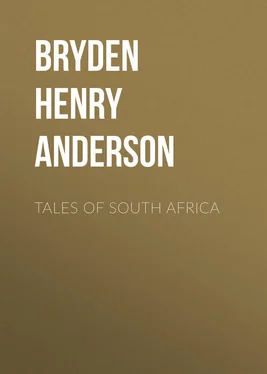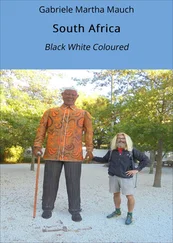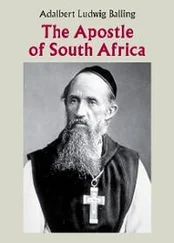Henry Bryden - Tales of South Africa
Здесь есть возможность читать онлайн «Henry Bryden - Tales of South Africa» — ознакомительный отрывок электронной книги совершенно бесплатно, а после прочтения отрывка купить полную версию. В некоторых случаях можно слушать аудио, скачать через торрент в формате fb2 и присутствует краткое содержание. Жанр: foreign_antique, foreign_prose, foreign_language, на английском языке. Описание произведения, (предисловие) а так же отзывы посетителей доступны на портале библиотеки ЛибКат.
- Название:Tales of South Africa
- Автор:
- Жанр:
- Год:неизвестен
- ISBN:нет данных
- Рейтинг книги:4 / 5. Голосов: 1
-
Избранное:Добавить в избранное
- Отзывы:
-
Ваша оценка:
- 80
- 1
- 2
- 3
- 4
- 5
Tales of South Africa: краткое содержание, описание и аннотация
Предлагаем к чтению аннотацию, описание, краткое содержание или предисловие (зависит от того, что написал сам автор книги «Tales of South Africa»). Если вы не нашли необходимую информацию о книге — напишите в комментариях, мы постараемся отыскать её.
Tales of South Africa — читать онлайн ознакомительный отрывок
Ниже представлен текст книги, разбитый по страницам. Система сохранения места последней прочитанной страницы, позволяет с удобством читать онлайн бесплатно книгу «Tales of South Africa», без необходимости каждый раз заново искать на чём Вы остановились. Поставьте закладку, и сможете в любой момент перейти на страницу, на которой закончили чтение.
Интервал:
Закладка:
You may never, indeed, see a Masarwa Bushman or woman who does not show marks of fire-burn upon the nether limbs. Among the old people, if you look close enough, you may see that their wrinkled breasts and bellies are scorched and raw also.
Nakeesa sat up, pushed a half-burned stick or two into the smouldering fire, and looked about her. Sinikwe lay still asleep. There was no need to wake him, and, indeed, he would resent such interference. She looked about her in a dull, rather hopeless way. There was no food in the camp – if camp it could be called. Sinikwe had shot or snared no meat of late. Drought lay upon the desert, and game was scarce. In a little while she must be digging for roots in the hard sunbaked soil, and her babe would be crying at her lean, starved breast. All day yesterday had she been sucking water from a moist hole in the ground, and discharging it from her mouth into ostrich shells and a calabash – a sufficiently fatiguing operation in thirsty soil. But these things alone hardly troubled Nakeesa. They were natural incidents of Bushman life, and scarce needed regrets. Something deeper and more bitter lay within her soul – something that even her cowed, submissive nature constantly rebelled against.
Twelve months since, Nakeesa’s father had handed her over to Sinikwe, who, for the consideration of two solid brass cartridge cases (articles much prized by Masarwas as snuff-boxes) and the half of a slain eland, had bought her as wife. Now Nakeesa had no great admiration for Sinikwe. He was a good hunter, it was true; all Masarwas are. But he was lazy, and not very amiable; he was ugly even for a Bushman; and she had had another youth in her eye. Kwaneet – the pleasant, merry Kwaneet – who had shown her several little kindnesses at Makwa Pool, and had presented her with many titbits of flesh, while their respective families squatted near that water, was the man of her secret choice.
Kwaneet, too, knew this, and was anxious to link his fortunes with Nakeesa’s; but, most unfortunately, Sinikwe had acquired the coveted cartridge cases from an English hunter, and had secured his wife. Kwaneet, it is true, could easily have slain an eland, and had offered to do so; but though, like Sinikwe, he carried at his neck – as every decent Masarwa should – his own well-polished brass cartridge case, as snuff-box, he had not two spare ones to offer Nakeesa’s father; and so he had lost Nakeesa, and Sinikwe had taken her.
Nakeesa’s eyes, as she squatted over the fire this morning, ranged over typical Kalahari scenery. In front of her lay an open grassy clearing, yellow with sun-parched winter grass. This and other glades in the vicinity Sinikwe meant to set fire to in a day or two, in order to renew the vegetation, as the first rains came on, and so attract the game. Beyond the clearing, and upon the left hand and right, stretched the pleasant open forest of the desert – groves of giraffe-acacia ( kameel doorn ), through which still wander freely in these pathless, waterless solitudes the tall giraffe, the portly eland, the brilliant red hartebeest, and the noble gemsbok (prototype of the fabled unicorn).
This Kalahari forest scenery, flat though it is, is very beautiful, resembling closely some English deer park, or the natural woodland of some wild Surrey common.
The deep red glow of sunrise was now apparent through the trees to the eastward, long streamers of rose-pink flew upwards in the pale sky; a roller or two, brilliant in gorgeous colouring of metallic mauves and violets, purples, blues, and greens, began to cry amid the forest, and to flash hither and thither across the clearing. Dainty steinboks and timid duykers (small antelopes, quite independent of water, to be found all over the desert) rose stiff from their cold night couches, shook themselves, and began to feed.
Suddenly a movement to the right attracts Nakeesa’s attention. She looks again, and an involuntary click of surprise and pleasure rises to her tongue. She touches her man lightly. Sinikwe is awake and upon his haunches in an instant; his narrow, bleared eyes seek what Nakeesa has seen, and they watch together in a motionless silence.
From behind a spreading acacia tree, from which it has been plucking the green leafage, strides into a little glade of the grove a great cow giraffe. She is fat and fresh, her dappled, orange-tawny hide gleams under the now risen sun with high condition, her great, melting, dark eye is placid and free from fear. Timid creature though she is, in these wilds she feels secure enough. She halts for a minute in the glade, lazily champing at a bit of acacia leafage which projects from her lips, and, raising her immense neck yet higher, and in the same motion swinging her head easily round, looks behind for her fellows. That giraffe cow, so plump, so well coloured, upon which Sinikwe’s eye is now fiercely rivetted, is young, but full grown. She measures seventeen good feet from the base of her hoofs to the tip of her false horns, as she stands there, and you may search all Africa – ay, all the world – for a more wonderful, more beautiful picture of feral life in its most primaeval form.
There is no air of wind blowing from the Masarwas towards the giraffe; the breeze trends rather the other way, and they are safe from betrayal by that foe. They are concealed from sight by the screen of bush beneath which they crouch, and a few handfuls of sand, cast by Sinikwe upon the smouldering fire, silently destroys that evidence of human life.
In another minute the great creature swings her head round, satisfied that her fellows are near, and stalks slowly on. She is but sixty yards away now, and, passing another group of trees and some bush, emerges upon the open glade. Before she has reached the further side, the rest of the troop are to be seen following in her wake. There are six of them in all: a mighty dark chestnut bull, nineteen feet tall, three more cows, and two calves. The beautiful giants stride like strange automatons across the clearing, with that gliding, deceptive walking pace of theirs, and join the leader at a great spreading acacia, from which they all begin to pluck, with upstretched necks and prehensile tongues, the dark-green foliage.
Sinikwe’s eyes had greedily followed the great cow in all her movements. That is the quarry he means to strike for. Luckily he had smeared his tiny bone-tipped reed arrows with fresh poison taken from the entrails of the N’gwa caterpillar only yesterday. He now picks up his bow and quiver, slings the latter across his back, and steals away by a circuitous route to intercept the troop. It is three hours before he gets his shot. At length, after infinite patience and manoeuvring, he has wormed himself into a patch of thick bush, by which, as he had reckoned, the great cow would pass. Stooping on one knee, he harbours there, motionless as some bizarre figure of bronze; the cow glides past, like some great desert ghost; Sinikwe lets fly his arrow deep into the thinnest part of her tough hide, under the hinder part of the belly; the startled creature flies crashing through the forest, and the Masarwa knows that with her death is now only a question of hours. It may be a day, or two days, or even three, but the poison already at work is fresh and at its deadliest; the arrowhead went well home, and the cow is his.
He returns to Nakeesa, gives her the news, and sends her into the grass veldt to dig up roots, while he himself prepares to make snuff. Taking her babe on her back, neatly slung in her skin cloak, Nakeesa hies her to a likely spot. She takes also with her an empty tortoiseshell in which to bring home the bulbs, and a sharp-pointed stick garnished at top with a circular piece of soft stone. With this last implement she can the more easily crow up their dinner.
Out there in the hot sun Nakeesa patiently digs and digs, slowly accumulating the dish of roots. The red sandy soil is now burning hot to the touch; there is no inch of shade from the scorching sun, and she has not tasted food or water for twenty hours. These things trouble the Bushwoman not at all; they have always been a part of her existence, and she cannot imagine a world without toil and heat, hunger and thirst. Just now, too, she is somewhat comforted at the thought of a mighty feast of meat in the not distant future. Sinikwe is lazy, and time after time neglects to hunt game when Kwaneet – Kwaneet is often in her mind – would have brought in good store of flesh. But Sinikwe, to give him his due, is as good a hunter and spoorer as any in the wide Kalahari, if the game is nigh and not far to seek. She knows that the giraffe is as good as dead, that soon, for a few brief days, she may revel in a gross plenty, and that her babe will be less petulant again. In two hours Nakeesa has filled the tortoiseshell and returns to her man.
Читать дальшеИнтервал:
Закладка:
Похожие книги на «Tales of South Africa»
Представляем Вашему вниманию похожие книги на «Tales of South Africa» списком для выбора. Мы отобрали схожую по названию и смыслу литературу в надежде предоставить читателям больше вариантов отыскать новые, интересные, ещё непрочитанные произведения.
Обсуждение, отзывы о книге «Tales of South Africa» и просто собственные мнения читателей. Оставьте ваши комментарии, напишите, что Вы думаете о произведении, его смысле или главных героях. Укажите что конкретно понравилось, а что нет, и почему Вы так считаете.












